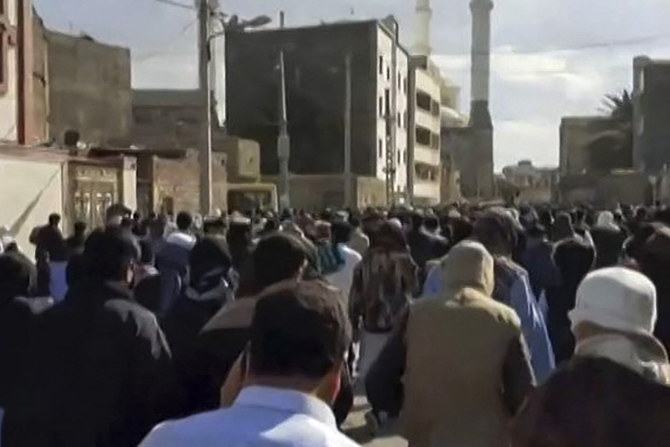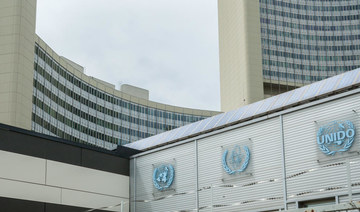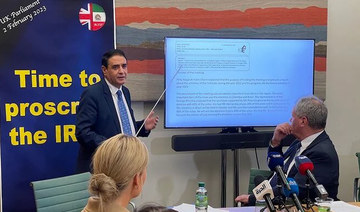JEDDAH: Iranian activists on Sunday dismissed Supreme Leader Ali Khamenei’s decree reportedly ordering amnesty or a reduction in prison sentences for “tens of thousands” of people detained amid nationwide anti-government protests shaking the country, acknowledging for the first time the scale of the crackdown.
“Khamenei’s hypocritical pardon doesn’t change anything,” said Mahmood Amiry-Moghaddam of the Oslo-based group Iran Human Rights.
“Not only all protesters must be released unconditionally, but also it is a public right that those who ordered the bloody repression and their agents are held accountable.”
The decree by Khamenei, part of a yearly pardoning by the supreme leader before the anniversary of the 1979 revolution, comes as a long-detained opposition leader called for a nationwide referendum on whether to write a new constitution for Iran.
State media also published a list of caveats over the order that would disqualify those with ties abroad or facing spying charges — allegations which have been met with wide international criticism.
Khamenei “agreed to offer amnesty and reduce the sentences of tens of thousands accused and convicted in the recent incidents,” the state-run IRNA news agency said in a Farsi report.
A later IRNA report carried by its English-language service said the pardons and commuted sentences were for “tens of thousands of convicts, including the arrestees of the recent riots in Iran.” Authorities did not immediately acknowledge the discrepancy in the reports.
Opinion
This section contains relevant reference points, placed in (Opinion field)
The reports about the decree offered no explanation for the decision by Khamenei, who has final say on all matters of state in Iran. However, prisons and detention facilities already had faced overcrowding in the country after years of protests over economic issues and other matters.
In Mir Hossein Mousavi’s call, posted by the opposition Kaleme website, he said he did not believe that Iran’s current system, which gives the final say to a supreme leader, worked any longer.
He also called for the formation of a constitutional assembly of “real representatives” to write a new constitution.
It remains unlikely that Iran’s theocracy will heed the 80-year-old politician’s call.
He and his wife have been under house arrest for years since his disputed presidential election loss in 2009 led to the widespread Green Movement protests that security forces also repressed.
Mousavi himself, however, had supported and served in Iran’s theocracy for decades.
Separately, former reformist President Mohammad Khatami urged “free and competitive elections” after the release of political prisoners both imprisoned and under house arrest.
“Reformism at least has faced a ... dead end, so people have a right to be (as) frustrated about it as they are about the ruling system,” Khatami said in a statement circulated online.
More than 19,600 people have been arrested during the protests, according to Human Rights Activists in Iran, a group that has been tracking the regime’s crackdown.
At least 527 people have been killed as authorities violently suppressed demonstrations, the group said. Iran has not offered a death toll for months.
On Sunday, state media published a list of caveats that would disqualify those who face spying charges, among others, from receiving a pardon. The list has been met with wide international criticism.
Khamenei “agreed to offer amnesty and reduce the sentences of tens of thousands accused and convicted in the recent incidents,” the IRNA news agency said in a Farsi report.
A later IRNA report carried by its English-language service said the pardons and commuted sentences were for “tens of thousands of convicts, including the arrestees of the recent riots in Iran.”
Authorities did not name any of those who had been pardoned or given shorter sentences.
Authorities also did not name any of those who had been pardoned or seen shorter sentences. Instead, state television continued to refer to the demonstrations as being a “foreign-backed riot,” rather than homegrown anger over the September death of Masha Amini, an Iranian-Kurdish woman detained by the country’s morality police.
Anger also has been spreading over the collapse of the Iranian rial against the US dollar, as well as Tehran arming Russia with bomb-carrying drones in its war on Ukraine.
More than 19,600 people have been arrested during the protests, according to Human Rights Activists in Iran, a group that’s been tracking the crackdown. At least 527 people have been killed as authorities violently suppressed demonstrations, the group said. Iran hasn’t offered a death toll for months. It already has executed at least four people detained amid the protests after internationally criticized trials.
All this comes as Iran’s nuclear deal has collapsed and Tehran has enough highly enriched uranium to potentially build “several” atomic bombs if it chooses, the United Nations’ top nuclear envoy has said. A shadow war between Iran and Israel has risen out of the chaos, with Tehran blaming Israel for a drone attack on a military workshop in Isfahan last week as well.
Meanwhile, a long-detained opposition leader in Iran is calling for a nationwide referendum about whether to write a new constitution for the Islamic Republic.
Mir Hossein Mousavi’s call, posted late Saturday by the opposition Kaleme website, included him saying he didn’t believe Iran’s current system giving final say to a supreme leader worked any longer. He also called for the formation of a constitutional assembly of “real representatives” to write a new constitution.
It remains unlikely Iran’s theocracy will heed the 80-year-old politician’s call. He and his wife have been under house arrest for years after his disputed presidential election loss in 2009 led to the widespread Green Movement protests that security forces also put down. However, he himself had supported and served in Iran’s theocracy for decades.
In 2019, Mousavi compared Khamenei to the former Shah Mohammad Reza Pahlavi, whose rule saw troops gun down demonstrators in an event that led to the Islamic Revolution.
Separately, former reformist President Mohammad Khatami urged “free and competitive elections” after the release of political prisoners both imprisoned and under house arrest.
“Reformism at least has faced a ... dead end, so people have a right to be frustrated about it as they are about the ruling system,” Khatami said in a statement circulated online.
Currently, hard-liners control all levers of power in the country. Reformists like Khatami and Mousavi previously sought to change and open up Iran’s Islamic Republic while maintaining its system. But increasingly, protesters have demanded an end to theocratic rule in the country.

















